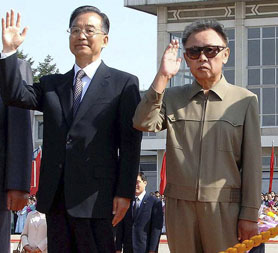China ‘contemplates reunified Korea’
New documents released by Wikileaks suggest there has been a major shift in China’s position on North Korea, with cables appearing to show it is ready to accept reunification with the South.

US embassy cables revealed that South Korea’s vice-foreign minister told US officials he was told by two senior Chinese officials that they believed Korea should be reunified under Seoul’s control.
The latest revelations threaten to aggravate tensions on the Korean peninsula, following Pyongyang’s missile attack on a South Korean island last week.
The cables related to discussions which took place in February between the-then South Korean vice-foreign minister, Chun Yung-woo and a US ambassador, Kathleen Stephens.
In a cable, Stephens said: “Citing private conversations during previous sessions of the six-party talks, Chun claimed (the Chinese officials) believed Korea should be unified under ROK (South Korea) control.
“The two officials, Chun said, were ready to ‘face the new reality’ that the DPRK [North Korea] now had little value to China as a buffer state – a view that, since North Korea’s first nuclear test in 2006, had reportedly gained traction among senior PRC (People’s Republic of China) leaders.
“Chun argued that in the event of a North Korean collapse, China would clearly ‘not welcome’ any US military presence north of the DMZ (demilitarised zone).
“Again citing his conversations with (the officials), Chun said the PRC would be comfortable with a reunified Korea controlled by Seoul and anchored to the US in a ‘benign alliance’ – as long as Korea was not hostile towards China.”
Financial benefits
The cable also showed that China had considered the potential financial benefits of ties with a hypothetical unified Korea.
Stephens, paraphrasing Chun, added: “Tremendous trade and labour-export opportunities for Chinese companies, would also help ‘salve’ PRC concerns about … a reunified Korea.”
The nature of that cable was echoed by another sent in June 2009 from the US ambassador to Kazakhstan, Richard Hoagland.
He reported that his Chinese counterpart, Cheng Guoping. was “genuinely concerned by North Korea’s recent nuclear missile tests. ‘We need to solve this problem. It is very troublesome,’ he said, calling Korea’s nuclear activity a ‘threat to the whole world’s security’.”
Cheng said Beijing “hopes for peaceful reunification in the long term, but he expects the two countries to remain separate in the short term”, Hoagland reported.
China’s objectives were “to ensure they (North Korean leaders) honour their commitments on non-proliferation, maintain stability, and ‘don’t drive (Kim Jong-il) mad’.”

Meanwhile, US President Barack Obama is considering taking legal action against Wikileaks following the release of the classified diplomatic cables.
White House spokesman, Robert Gibbs, told a press conference yesterday: “I think it is safe to say that the president was – it is an understatement – not pleased with this information becoming public.
“As you saw during the presidential campaign and during his time in the White House, an open and transparent government is something the president believes is truly important. But the stealing of and dissemination of classified information is a crime.
“Obviously, there is an ongoing criminal investigation about the stealing of and dissemination of sensitive and classified information.”
Security concern
Mr Gibbs revealed that the White House admitted fears over the security of classified information.
He said: “I don’t think anyone would stand here and tell you this isn’t a concern about security.
“This is a concern as you heard the secretary of state discuss some of this information could contain names of people working with our government to help on issues like human rights on issues of democracy in places where those aren’t so easy to work on.”
But in Caracas, Venezuelan President Hugo Chavez commended the “courage and bravery” of WikiLeaks and its founder Julian Assange.
Chavez said the documents showed that the US was a “failed state.”
“They discard all the principles of ethics, respect for their own allies,” Mr Chavez said.
-
Latest news




